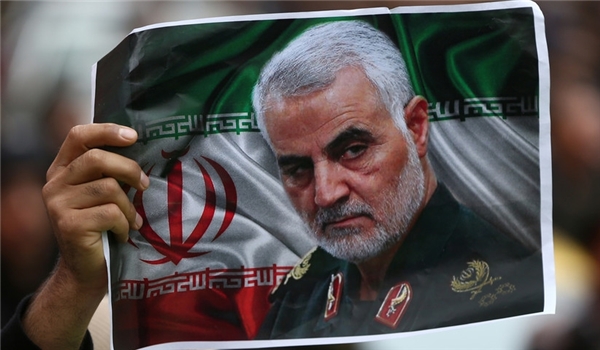Al-Jazeera Podcast in Praise of Gen. Qassem Soleimani Receives Wide Acclaim in ME, Infuriates Saudis
Qatar’s state-run broadcaster Al-Jazeera’s motion graphics podcast glorifying Iran’s martyred Islamic Revolution Guards Corps (IRGC) Qods Force Commander Lieutenant General Qassem Soleimani received wide acclaim and admiration from across the world, but certainly not from Saudi Arabia and its media, including Al-Arabiya TV.

The Saudi-owned Al-Arabiya released the podcast on its twitter page just to express that it’s gone mad, while the global audience admired the Qatari broadcaster for the move.
Al Jazeera’s podcast was part of its ‘Rumooz’ series (which is the Arabic word for ‘icons’), and introduced the episode by saying that “his star has shone in the Iran-Iraq war, then he became the engineer of most of Iran’s foreign battles, leaving his mark on some of the most volatile areas in the region: Syria, Yemen, Iraq and others. His assassination almost ignited a third world war. who is Qassem Soleimani?”
The podcast’s introduction was filled with cinematic music that builds dramatically, leading to the opening statement.
“I am Soleimani, the soldier fighting for the sake of Allah… The name great Satan fears… I am nothing more than a soldier of the Islamic Revolution… A soldier, I thank Allah, for blessing me with martyrdom,” the voice actor said.
The podcast’s voice actor speaking as Soleimani said, “We defended Syria, its people, and the whole region against the American-Zionist conspiracy and terrorism, and Iran has become a source of stability in Syria… We helped them using our experience through non-military jihadi groups.”
“Hezbollah, Hamas, and the Islamic Jihad Movement are not proxy groups, but are our brothers and partners in the resistance project against the Zionist regime.”
The voice actor also referred to the cowardly assassination of General Soleimani at Baghdad airport in January by the US drones, and said, “The cowards do not dare to go for direct confrontation. Instead, they attacked my car from the air.”
Lieutenant General Soleimani and Deputy Commander of Iraq’s Popular Mobilization Forces (PMF) Abu Mahdi al-Muhandis were assassinated in a US drone strike on Baghdad International Airport in Iraq on January 3.
On January 8, the IRGC Aerospace Force started heavy ballistic missile attacks on US Ein Al-Assad airbase in Southwestern Iraq near the border with Syria and a US operated airbase in Erbil in retaliation for the US assassination of General Soleimani.
Ein Al-Assad is an airbase with a 4km runway at 188m altitude from sea levels, which is the main and the largest US airbase in Iraq. Early reports said the radar systems and missile defense shields in Ein Al-Assad failed to operate and intercept the Iranian missiles. Unofficial reports said the US army’s central radar systems at Ein Al-Assad had been jammed by electronic warfare.
The second IRGC reprisal attack targeted a US military base near Erbil airport in Iraqi Kurdistan Region in the second leg of “Martyr Soleimani” reprisal operation.
Iraq said the attacks had not taken any toll from its army men stationed at these two bases. The US army had blocked entrance into Ein Al-Assad to everyone, including the Iraqi army.
It was the first direct attack on the US army ever since world war two.
The IRGC officials said none of the missiles had been intercepted.
Iran has repeatedly stressed that Ein Al-Assad missile attack was just the start of its revenge for the US assassination of its top General, and not the end of it. Tehran has declared expulsion of the US troops from the region as its ultimate goal.







